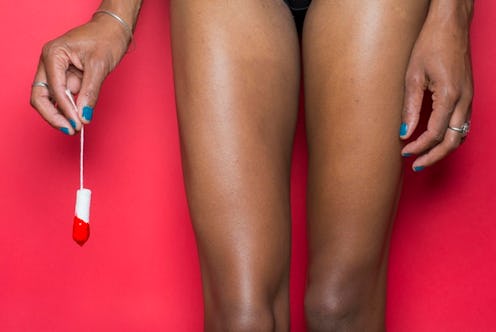Life
Here's The Reason Your Cycle May Be Out Of Whack After A Vacation

Does travel affect your period? Anecdotally, I can say yes. I traveled full time for five and a half years and when I went to a new country, it absolutely messed with my cycle. After flying somewhere new, my period would come late — or not at all. My PMS would be rougher. And sometimes it would take a month or two to get back on track. So, yes, travel absolutely affected my period.
But I never know exactly why that was. It was sort of just understood that traveling might disrupt your menstrual cycle, but it’s not like any of my traveling friends were doctors or biologists who could explain it to me. It was just another of the great mysteries of the ovulating body — one of many, considering this stuff is pretty much never explained to us.
Since that time when I was traveling constantly, I've become a certified sex educator. And I learned a lot about how my body works. So before we dive into why I (and so many other people) experience disruptions in my cycle when I travel, let’s talk a little bit about how hormones and the menstrual cycle actually work.
The menstrual cycle is all about hormones — and I’m not just talking about PMS. Basically, your body is going through a series of hormone releases that trigger certain things inside your body. The main hormones involved are estrogen, progesterone, follicle-stimulating hormone, and luteinizing hormone.
Your cycle starts on the first day of your period, but it’s not until the end of week one that you start to see estrogen levels rise. That estrogen is building up new uterine lining, in preparation for an egg to implant. Many people feel energized and upbeat during this part of their cycle, thanks to rising estrogen levels.
Then, around day 14, your body releases follicle-stimulating hormone, which does exactly what the name says: Stimulates the follicles in your ovaries in order to get them prepped to grow and release an egg. (You also get a little boost of testosterone at this point, which is one of the reasons why many people feel hornier when they’re ovulating.) Once an egg has formed and is ready to go, your body releases luteinizing hormone, which ruptures the follicle and releases the egg from the ovary.
One of the major things that affects your hormones — and that gets disrupted during travel — is your circadian rhythm.
That ruptured follicle closes up and starts releasing progesterone. This is the hormone that peaks your temperature during ovulation. If you don’t get pregnant, both the progesterone and estrogen start to drop, which helps the lining of your uterus separate and brings on your period. (If you do get pregnant, a whole bunch of other stuff happens, but that's for another article on another day.) You’ll see another peak of both hormones at the end of week three, but this time you have more progesterone than estrogen. Higher levels of progesterone are to blame for that tired, foggy feeling you sometimes get right before your period.
As you can see, it’s a complicated process. And hormone production and release doesn’t live in isolation of other functions in your body. One of the major things that affects your hormones — and that gets disrupted during travel — is your circadian rhythm. Your circadian rhythm is your sleep/wake cycle and it's how your body knows when to be awake and when to go to bed. When your circadian rhythm is disrupted, it can disrupt hormone production. And, ultimately, that disruption can mess up your period.
So what can you do? Unfortunately, the only way to make sure that travel doesn’t affect your period is to not travel — and who wants that? So, instead, focus on getting enough sleep, eating regularly, and getting your body back on schedule. Once you’re in a rhythm again, your menstrual cycle should sync up as well.
However, if you’re feeling especially messed up — and you can’t seem to get back on track — there are supplements and herbs you can take to help your body regulate. Ask your doctor for help figuring out what might work best for your or, if your doc isn’t super pro-natural solutions, you can seek out a good herbalist or acupuncturist in your area. While air travel is relatively new in the history of humanity, messed up hormones are not — and there are plenty of potential non-pharmaceutical solutions out there.